
views
- Use the Homeland Security Investigations online tip form or call the ICE hotline at 866-347-2423 to report illegal immigrants to the US.
- Call 1-800-BE-ALERT to report illegal border crossings to US Customs and Border Protection (CBP).
- Contact local police if you have reason to believe the people who are undocumented are also violating state criminal law.
- Call 911 to report a crime in progress or imminent threat to public safety.
Contacting Federal Agencies Online

Collect as much specific information as you safely can. Federal agencies are more likely to act on your report if it includes plenty of specific information that they can go on. At a minimum, have a location and a physical description of the people you're reporting (if not names). Include only specific facts you've personally observed. For example, if there's an abandoned house next door that you suspect is being used for human trafficking, take down the address, dates and times you see people coming and going, and descriptions of the people and the vehicles. Don't imperil your own safety or that of others to get information. Try to keep at a distance—your tip will be more valuable if the people don't suspect they've been discovered.

Establish a private internet connection. Use a proxy or join a virtual private network (VPN) to mask your IP address if you want to submit an online report from home. You could also use a public computer, such as one at the library, or use your own computer or other device on a public Wi-Fi network. This is especially important if you fear that your home network has been hacked or your online activities are being monitored.

Make a separate email address that can't be traced back to you. Online forms might not require any email address at all, in which case your anonymity is guaranteed. But just in case, a separate email address protects you from revealing your identity. It also means you won't get any emails related to your report in your regular email inbox, so no one can find out about your report that way.
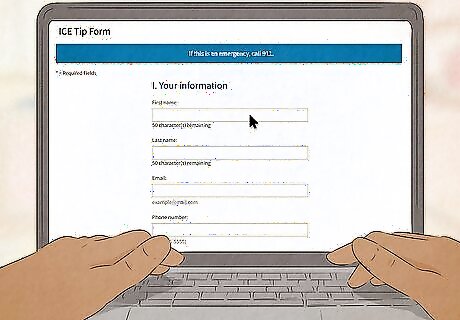
Fill out the ICE tip form to report immigration violations. If you think someone is in the U.S. unlawfully or that an illegal immigrant has committed a crime, use this form. Provide as much information as you can with as many specifics as you have. Make sure everything you include in the form is a concrete fact that you observed, not speculation on your part. For example, if you know that someone who lives next door to you was deported and you see that they've returned, report them to ICE. Read the opening paragraphs at the top of the form so you understand how ICE will use your information.
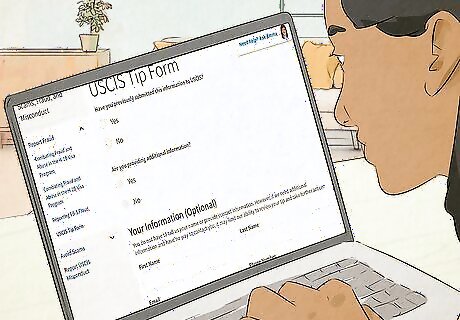
Use the USCIS form to report fraud. US Citizenship and Immigration Services (USCIS) handles complaints of fraud related to the immigration application process, such as fraudulent asylum applications or fraud related to employment visas. You can report individuals as well as businesses, where appropriate. For example, if you know that your employer falsified documents to get visas for employees, report that to USCIS.
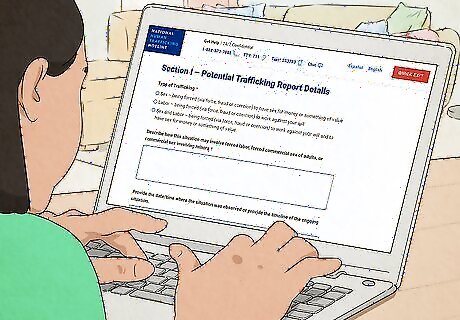
Report human trafficking to the National Human Trafficking Hotline. Human trafficking refers to someone being forced—through physical force, fraud, or coercion—to work or engage in commercial sex acts against their will. If you have information about such activities, the US government will take action to protect the victims and get them out of danger. For example, if you've seen women or children being shuttled into a house and never coming out, despite seeing other people coming and going, that's potential evidence of human trafficking. The hotline is supported by the Administration for Children and Families (ACF), which is part of the US Department of Health and Human Services (HHS).

Fill out the Border Patrol form to report illegal border crossings. US Customs and Border Protection (CBP) handles issues involving the physical border of the US. If you live near the border and observe illegal border crossings or other illegal activities, such as drug or human trafficking, report it to the CBP so they can investigate. For example, if you notice the same person waiting near the border and picking up people crossing at night, report that activity to CBP.
Contacting Federal Agencies by Phone

Organize the information you want to report. Write down specific events you've observed in chronological order, along with all relevant details about what happened and the people involved. This makes it easier for the agent or officer to take down your report in a straightforward way. For example, you might write down 3 different dates you observed people coming and going from a house, then organize the details you observed on each date.
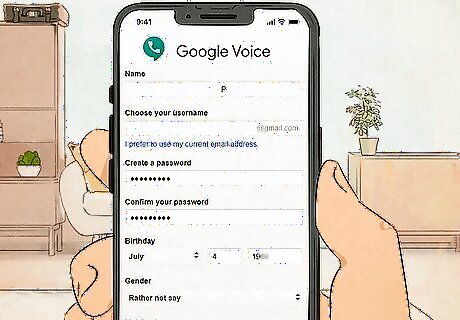
Get a virtual phone number online. Search for a website or app that offers voice over IP (VoIP) services. One of these numbers ensures that your call can't be traced back to your personal phone number. If you don't trust the "virtual" aspect, head to your nearest big-box store and pick up a cheap, prepaid "burner" phone and use that to make the call.
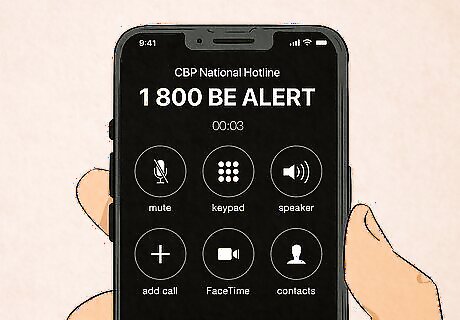
Call the local Border Patrol station if you live near the border. Use the CBP directory to find the phone number for the Border Patrol station closest to you (or to the location where you saw the activity). Give the agent who answers the phone a detailed account of what you saw. CBP also has a national hotline where you can report general illegal activity related to the border. Call 1-800-BE-ALERT. For example, if you observed someone waiting by the border on several occasions to take people or crates from the back of a truck, call CBP.

Use the ICE tip line if you don't live near the border. Call 866-347-2423 to report criminal activity involving undocumented immigrants. Operators are standing by 24 hours a day, 7 days a week at this number. For example, if you know people at your workplace were deported, but they've recently returned to work, report that to ICE. Don't use the ICE tip line if you've already submitted an online report. Sending the same information more than once won't change the way ICE handles the information.

Call the National Human Trafficking Hotline to report forced sex or labor. Call 800-373-7888. Lines are open 24 hours a day, 7 days a week. You could also text your tip to 233733 if you prefer text to talking on the phone. For example, if you saw women being led out of a van into a house and then never saw those women again, that might be evidence of human trafficking. To report human trafficking involving kids, call 800-843-5678 to provide information to the National Center for Missing and Exploited Children.

Contact the Department of Justice (DOJ) to report immigration fraud. The DOJ separately handles fraud that's specifically related to immigration court proceedings. Call 877-388-3840 to report your information to the Executive Office for Immigration Review's Fraud and Abuse Prevention Program. For example, if someone was bragging to you that they lied in immigration court to keep someone else from getting deported, report that to the DOJ. The DOJ doesn't have an online form. If you'd prefer to write your report out, email it to [email protected].
Reporting to Local Police

Gather information about any suspected criminal activity. State and local law enforcement don't have the authority to arrest someone simply for being an illegal immigrant. But they can arrest anyone who's violating state criminal law. Provide enough information (if you can) that they have probable cause to investigate or arrest that person. The Department of Homeland Security (DHS) recommends including the following: Who you saw conducting the criminal or suspicious activities What sort of activities you saw them doing When you saw them doing the activities you're reporting Where they were conducting these activities Why you think what you saw was suspicious or criminal

Use a different phone or computer to maintain your anonymity. If you feel your anonymity is important to protect yourself and your family, make sure the report can't be traced back to you, your household, or your workplace. This might involve setting up a virtual phone number or using a secure browser to file a report online. If you just want to make sure that the people you're reporting don't find out the report came from you, it likely doesn't matter if the police can trace your phone number.

Call the local police tip line or submit an online report. Larger police departments are more likely to have an online reporting system in place. Use the DHS map to easily find your local tip line. Another option is to call a national number, such as Crime Stoppers, which will forward your information anonymously to the appropriate law enforcement agency. Call 911 if you're reporting a crime in progress, especially if there's a risk of violence. The 911 operator will ask for your name and contact information, but you can always tell them that you wish to remain anonymous.




















Comments
0 comment